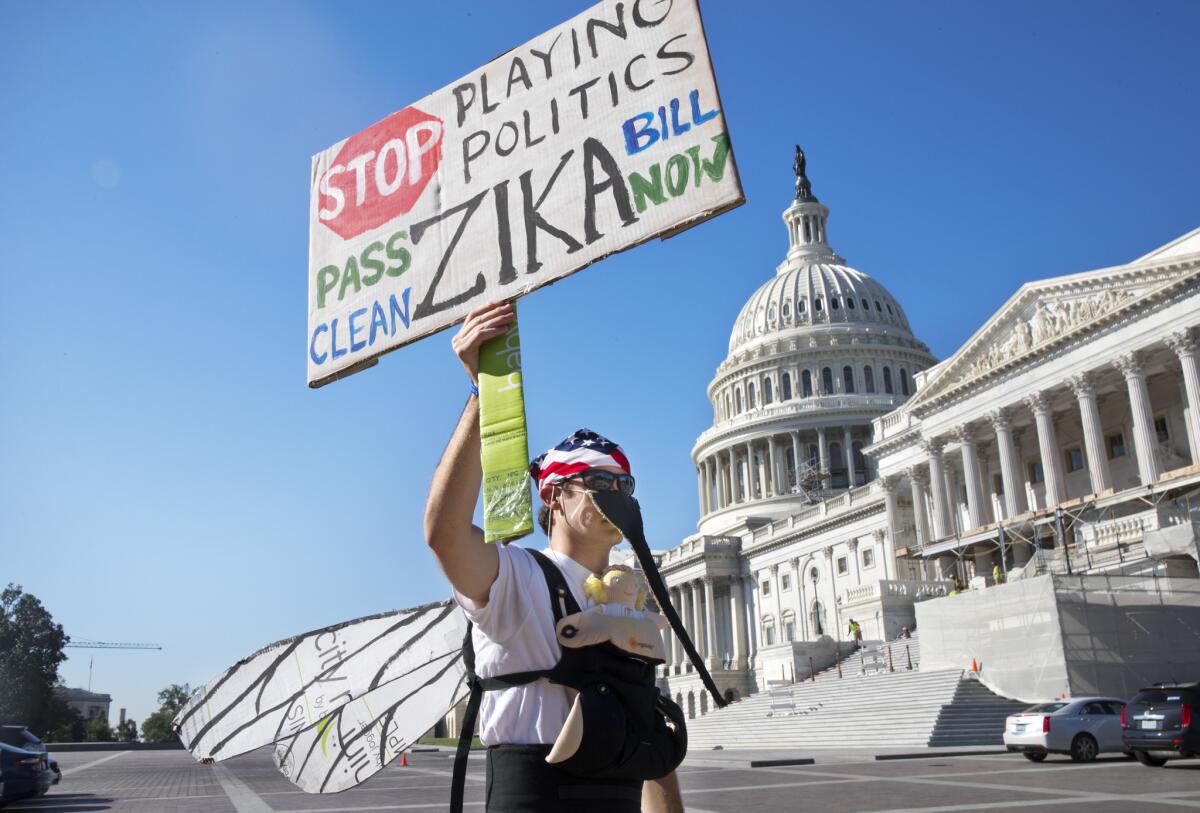Congress OKs deal to avoid shutdown and fund government — for 10 weeks

- Share via
Reporting from washington — Acutely partisan and all but dysfunctional, Congress has completed its most elementary task after an intense weeks-long struggle, finalizing a deal to fund the government just days ahead of a shutdown deadline.
The legislation extends existing spending levels a mere 10 weeks, past the Nov. 8 election, while finally addressing the Zika crisis with $1.1 billion and providing long-sought help for the residents of Flint, Mich., as well as flood victims in Louisiana.
After a last-minute burst of deal making, the legislation passed the Senate on a 72-26 vote Wednesday and was backed by the House 342-85 in a late-night vote hours later.
It was a conclusion in sight and within reach since lawmakers returned from their summer recess after Labor Day. But with the Capitol awash in election-year politics, shadowed by the contentious presidential race and engulfed in a fierce battle for control of the Senate, the simplest task became nearly impossible.
Republicans, defending a fragile Senate majority and eager to get a handful of vulnerable incumbents back home to campaign for reelection, accused Democratic leader Harry Reid of Nevada of holding up a deal just to keep GOP lawmakers in Washington.
“The Democrats are determined to keep us here as long as they can,” groused one at-risk Republican senator, Patrick J. Toomey of Pennsylvania.
Democrats denied it but lobbed their own allegations, all but accusing Republicans of racism for holding up money for people affected by lead-tainted water in predominantly black Flint, the final sticking point in the talks.
“All they’d have to do is put Flint in and we’d be out of here in a minute,” said Sen. Charles E. Schumer (D-N.Y.). “We want to get out of here. They’re the ones holding it up.”
Compromise on a $170-million Flint aid package ultimately gave Democrats a partial victory; the GOP-dominated Louisiana delegation won a down payment on President Obama’s $2.6-billion request for the state. The Zika deal was the resolution of a vexing dispute after Obama made his initial request for federal money in February.
The situation produced frustration all around as lawmakers of both parties lamented their inability to get their basic work done, even if each party insisted the other was to blame. The gridlock that has kept Congress’ approval ratings below 20% for years was on vivid display at a moment when the electorate has made crystal clear that it wants an end to Washington’s dysfunction and inability to address the country’s problems.
Yet even as they stumbled to a messy solution to meet the Friday midnight deadline, some lawmakers were looking ahead to next year, when tough tasks await the next Congress and new president.
A two-year budget deal agreed to a year ago under former Republican House Speaker John A. Boehner pushed a number of major issues into 2017, in particular the fight over raising the government’s borrowing limit. The debt limit will need to be raised by around midsummer, a move that has provoked intense battles.
ALSO
Supreme Court to decide if offensive names such as ‘Redskins’ and ‘Slants’ can be trademarked
Trump’s rise draws white supremacists into political mainstream: ‘I am winning,’ says David Duke
In a first, Congress rebukes Obama with a veto override of 9/11 bill
More to Read
Sign up for Essential California
The most important California stories and recommendations in your inbox every morning.
You may occasionally receive promotional content from the Los Angeles Times.










